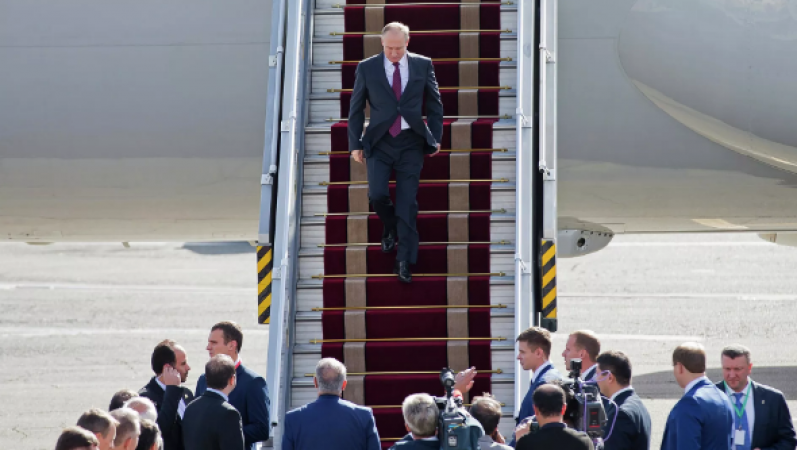
TEHRAN: Russian President Vladimir Putin's visit to Iran begins on Tuesday, with the goal of strengthening ties with regional heavyweights as part of Moscow's challenge to the United States and Europe in the midst of its grinding campaign in Ukraine.
Putin is scheduled to meet with Iranian President Ebrahim Raisi and Turkish President Recep Tayyip Erdogan about the region's pressing issues, including the Syrian conflict and a United Nations-backed proposal to resume Ukrainian grain exports to alleviate the global food crisis, on only his second trip abroad since Russia sent tanks rolling into its neighbour in February.
As the West imposes sanctions on Russia and the costly military campaign continues, Putin is attempting to strengthen ties with Tehran, a fellow target of severe US sanctions and a potential military and trade partner. According to the White House, Russian officials visited an airfield in central Iran at least twice in recent weeks to review Tehran's weapons-capable drones for possible use in Ukraine.
But, perhaps most importantly, Tehran provides Putin with an opportunity for a high-stakes meeting with Erdogan, who has sought to help broker talks on a peaceful resolution of the Russia-Ukraine conflict as well as negotiations to unblock Ukrainian grain through the Black Sea.
Turkey, a NATO member, has found itself in conflict with Russia in Azerbaijan, Libya, and Syria. However, Turkey has not imposed sanctions on the Kremlin, making it a vital partner for Moscow. Turkey, which is dealing with runaway inflation and a rapidly depreciating currency, also relies on the Russian market.
The gathering has symbolic significance for Putin's domestic audience as well, demonstrating Russia's international clout even as it becomes increasingly isolated and embroiled in conflict with the West. It comes just days after President Biden visited Israel and Saudi Arabia, Tehran's main regional rivals.
From Jerusalem and Jidda, Biden urged Israel and Arab countries to counter Russian, Chinese, and Iranian influence, which has grown in response to the perception of America's withdrawal from the region. It was a difficult sell. Israel keeps good relations with Putin, which is necessary given Russia's presence in Syria, Israel's northeastern neighbour and frequent target of its airstrikes. So far, Saudi Arabia and the United Arab Emirates have refused to pump more oil beyond the limits set by their energy alliance with Moscow.
With the West and its regional rivals backing it into a corner, the Iranian government is increasing uranium enrichment, cracking down on dissent, and grabbing headlines with optimistic, hard-line stances designed to keep the Iranian currency, the rial, from collapsing. Without any prospect of sanctions relief, Iran's tactical alliance with Russia has become one of survival, despite the fact that Moscow appears to be undercutting Tehran in the black market oil trade.
The three presidents' talks will centre on Syria's decade-long conflict, in which Iran and Russia have supported President Bashar Assad's government and Turkey has supported armed opposition factions. Russia entered the conflict in 2015, joining forces with Hezbollah militants in Lebanon and Iranian forces, using air power to shore up Assad's fledgling military and eventually turning the tide in his favour.
Russia seeks oil payments from India in UAE dirhams
Six killed in Russian Strike On Eastern Ukrainian Town Toretsk
Zelensky Fires Security Chief, Prosecutor General